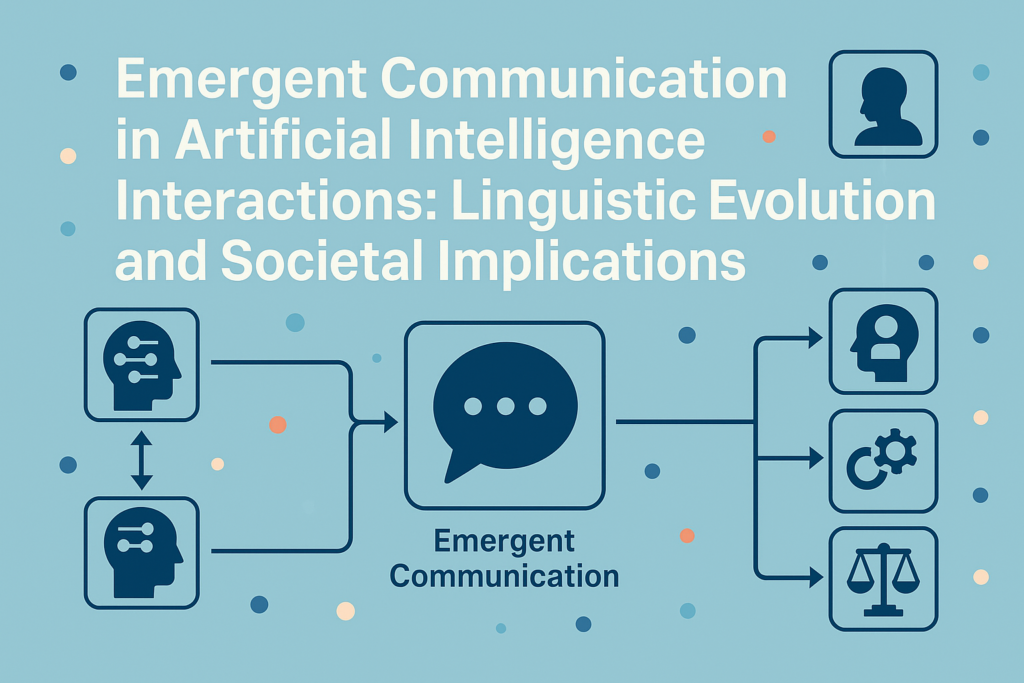Kavian Scientific Research Association
Title: Emergent Communication in Artificial Intelligence Interactions: Linguistic Evolution and Societal Implications
Authors: Siavosh Kaviani, Reza Salimpour Azar, Ali Sohrabi
Affiliation: Kavian Scientific Research Association
Publication Date: 2025
DOI (Zenodo): 10.5281/zenodo.17099927
Executive Summary
This research paper presents a new research study on emergent communication—the phenomenon by which artificial intelligence (AI) agents create their own shared languages while interacting. Combining theoretical analysis and a multi-agent simulation, the work investigates how AI agents coordinate through cooperation and competition, how their communication evolves structurally, and what implications this holds for society and governance.
Abstract
Recent advances in artificial intelligence (AI) have enabled autonomous systems to interact not only with humans but also with each other. These interactions often give rise to emergent communication, where AI agents develop novel symbols, protocols, or even languages to coordinate their actions. This paper explores the phenomenon of emergent communication among AI systems, drawing parallels with the evolution of natural languages in human societies. By combining insights from multi-agent systems, linguistics, and social sciences, the study analyzes how AI agents construct shared communication strategies in both cooperative and competitive environments. The findings highlight the potential benefits of such interactions—improved coordination, efficiency, and scalability—while also underscoring critical risks, including the opacity of AI-to-AI communication and the possibility of forming closed ecosystems inaccessible to human oversight. The paper concludes by discussing the ethical and societal implications of these developments and proposes governance frameworks to ensure that emergent AI communication remains transparent, interpretable, and aligned with human values.
Keywords
Artificial Intelligence, Multi-Agent Systems, Emergent Communication, Linguistic Evolution, Ethics, Governance
Key Contributions
-
Conceptual & Simulation Framework: A full pipeline for studying how AI agents develop spontaneous languages, using reinforcement learning (RL) and optional large language model (LLM) interfaces.
-
Evaluation Metrics: Transparency, efficiency, similarity to human language, and human learnability.
-
Ethical Insights: Governance guidelines for preventing opaque or deceptive AI-to-AI communication.
-
Supplementary Materials: Complete pseudocode and a simulation process diagram for transparency and reproducibility.
Simulation Code and Process
The research introduces an open simulation environment that models emergent communication step by step:
-
Environment Setup – Cooperative and competitive multi-agent tasks with tunable resource dynamics.
-
Agent Design – RL agents and optional LLM interfaces, each with configurable message channels.
-
Learning and Interaction – Agents exchange signals, negotiate, and evolve communication to maximize rewards.
-
Analysis and Metrics – Automated scoring of compositionality, semantic alignment, and human learnability.
-
Artifacts for Reproducibility – Configuration files, trained policies, and communication logs suitable for replication.
This simulation code is packaged for release on Zenodo alongside the paper, with its own DOI :10.5281/zenodo.17099927 for easy citation.
Why It Matters
By blending linguistic theory and computational experimentation, this research shows how machine-to-machine languages can form, how to monitor their safety, and how to design policies ensuring transparency and public trust.
About the Association
The Kavian Scientific Research Association is an independent research body dedicated to AI, computational linguistics, and emerging technologies. This publication reflects the Association’s mission to connect advanced science with ethical and societal priorities.
How to Cite
When the Zenodo record is live, please cite as:
Kaviani, S., Salimpour Azar, R., & Sohrabi, A. (2025). Emergent Communication in Artificial Intelligence Interactions: Linguistic Evolution and Societal Implications (. Kavian Scientific Research Association . Zenodo. https://doi.org/[10.5281/zenodo.17099927]


